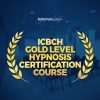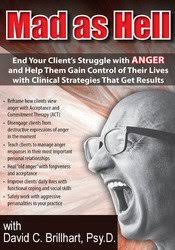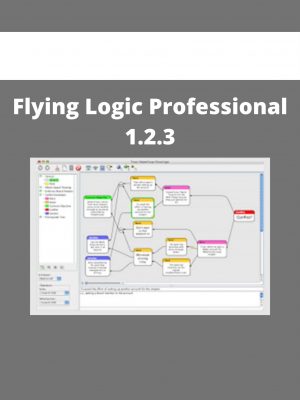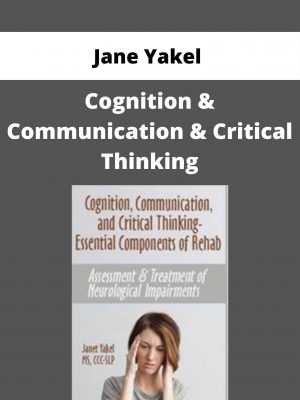David C. Brillhart – Mad as Hell, End Your Client’s Struggle with Anger and Help Them Gain
$200 Original price was: $200.$75Current price is: $75.
Shopping Instructions:
- DISCOUNT 15% : SHOP15
- Product Delivery: Within 1 – 12 hours after purchase.
Grounded in Acceptance and Commitment Therapy (ACT), this essential recording will give you the tools you need to teach your clients to accept their anger as a normal emotion, and fundamentally change their destructive reactions.
David C. Brillhart – Mad as Hell, End Your Client’s Struggle with Anger and Help Them Gain
Broken families and ruined careers. Drug abuse, incarceration, and heart attacks. These are the extreme, life-shattering impacts of excessive anger. It’s devastating your clients, destroying their families, and putting their health and lives at risk.
Some clients fight their anger, attempting to bury it deep inside. Others express it outwardly to ruinous results. Most aren’t ready to make a change in their life, but have been forced to do so by their partner, their employer, or the court system. Reluctant to give up the feelings of power and righteousness generated by their fury, your best efforts are stymied by their unwillingness to deal with the core problems their anger masks. And angry clients can be aggressive in session. It’s all too easy to refer them to another counselor, letting their anger push you away like so many others.
Grounded in Acceptance and Commitment Therapy (ACT), this essential recording will give you the tools you need to teach your clients to accept their anger as a normal emotion, and fundamentally change their destructive reactions. Full of practical applications and detailed instruction, you’ll leave with a playbook to help your clients let go of their emotional struggle with anger and gain control of their lives through values-clarified action. You’ll be able to assess readiness for change, and cultivate transformation with motivational strategies that engage your most reluctant and treatment-resistant clients. Lessons on mindfulness, values clarification, and problem solving are coupled with experiential exercises and targeted techniques to reduce your clients anger responses and empower them to manage their reactions to anger at work, on the road, and in their most important personal relationships.
Key benefits of watching:
- Acceptance and Commitment Therapy (ACT) skills that reduce negative self-talk and self-judgement, and reframe dysfunctional thoughts that lead to excessive angered outbursts.
- Mindfulness techniques and disengagement strategies that lower the anger response and help clients walk away from conflict and toward valued-living choices.
- Strategies that help clients define their core values and discover the principles they want to guide their lives.
- Assertiveness training that teaches clients how to communicate anger constructively and without aggression.
- Easy-to-implement interventions that heal “old anger” and move clients toward their core values through the power of forgiveness and acceptance.
- Functional coping and social skills clients can use to improve their daily lives and keep them grounded and in-control while on the road, at work, or at home.
- In-session tactics that avoid automatic defensiveness and allow you to work effectively and safely with aggressive personalities.
Watch this recording and learn to help clients of all ages regulate their responses to excessive anger and provide them with valuable life-affirming alternatives to the dysfunctional and aggressive behaviors that damage their lives!
- Engage reluctant and treatment-resistant clients with in-session mindfulness-based strategies.
- Manage responses to dysfunctional thoughts and judgmental beliefs with ACT skills that effectively intervene in these processes.
- Reduce the body’s anger response with mindfulness training and diaphragmatic breathing techniques that diminish the body’s fight-or-flight response.
- Teach clients how to communicate anger constructively with assertiveness techniques that increase their emotional vocabulary and enable them to handle conflict without aggression.
- Conduct a cost-benefit analysis intervention with clients to demonstrate the impact of “old anger” on their lives, and give them the tools to move past it with acceptance.
- Employ clinical strategies that help avoid automatic defensiveness in clients and allow you to work safely with aggressive personalities.
Would you like to receive David C. Brillhart – Mad as Hell, End Your Client’s Struggle with Anger and Help Them Gain ?
What We Resist, Persists: Why Fighting/Hiding Our Anger Doesn’t Work
- The fight-flight-freeze response of anger
- Understand the contextual role of anger through ACT
- The cost of avoidance
- Target populations
- Oppositional Defiant Disorder, Conduct Disorder, Antisocial Personality Disorder, Depression, Substance Abuse, Trauma
- Mindful engagement techniques for resistant clients
Address Maladaptive Anger Reactions Before They Start: Reframe Dysfunctional Thoughts with ACT
- Triggers – Identification and strategy selection
- Experiential exercise: Values clarification
- Cognitive defusion from judgmental thoughts
- Intervene in unwanted thoughts and self-judgment
- Values-guided behavior choices while in the grip of anger
Handle Destructive Anger Expressions in the Moment: Skills that Tame the Anger Response
- Mindfully monitor indicators of anger
- Emotional
- Physiological
- Mindfulness techniques to reduce the anger response
- Reset with breath
- Guided imagery
- Carry out goals in the midst of anger
- Disengagement strategies
Facilitate Forgiveness with Acceptance: Therapeutic Strategies That Address Old Anger
- 3 reasons why forgiveness (and self-forgiveness) is never easy
- Prerequisites to letting go of the past
- Conduct a cost-benefit analysis intervention
- Experiential exercise: Letting go of the past
Teach Clients to Communicate Anger Constructively and Without Aggression
- Communicate anger effectively with “I” statements
- The active role of acceptance in the midst of anger
- Experiential exercise: Living with vs. Living in anger
- Mindfully respond to anger in interpersonal relationships
Handle Difficult (and Angry) Clients in the Clinical Setting
- Respond contextually to avoid automatic defensiveness
- Modeling flexibility and acceptance
- In-session strategies that keep you safe
- Experiential exercise: Seeing your clients through their eyes
Related products
NLP & Hypnosis
NLP & Hypnosis
NLP & Hypnosis
Joseph Cohen – The SelfHacked Secrets To Understanding Why You Are Sick And How To Get Well
NLP & Hypnosis
NLP & Hypnosis
NLP & Hypnosis
NLP & Hypnosis
NLP & Hypnosis












